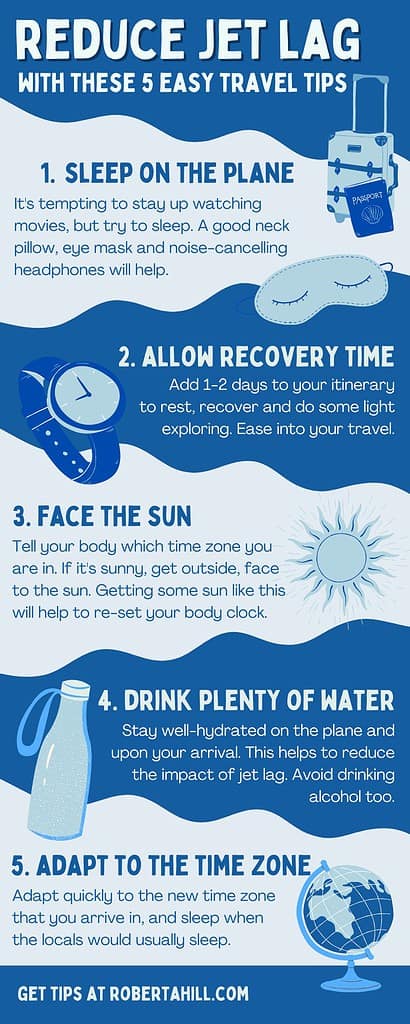
It’s important to note that individual experiences with jet lag can vary, and factors such as the flight duration, the time of day you travel, and your overall health and sleep habits can also affect how severe your jet lag is.
Jet lag can be particularly challenging for older travellers due to changes in their sleep patterns and circadian rhythms naturally occurring with aging. As we age, our sleep tends to become lighter and more fragmented, and our bodies become less able to adapt to changes in our sleep schedule.
Some of the challenges of jet lag on older travellers include:
- Increased fatigue and sleep disturbances: Older adults may experience more severe fatigue and sleep disturbances after long flights, making it more challenging to adjust to a new time zone.
- Increased risk of health complications: Jet lag can exacerbate existing health conditions in older adults, such as diabetes, heart disease, and hypertension. Travel stress can also weaken the immune system, increasing the risk of illness.
- Increased difficulty adjusting to new time zones: Older adults may have more difficulty adjusting to new time zones due to changes in their circadian rhythms. This can make it harder to recover from jet lag and resume normal sleep patterns.
- Medication interactions: Older adults may be taking medications that can interact with sleep aids or other medications commonly used to treat jet lag, making it more challenging to manage their symptoms.
To mitigate the challenges of jet lag, travellers of all ages can take several steps to prepare for their trip, including:
- Gradually adjusting sleep patterns before the trip: Older adults may benefit from gradually adjusting their sleep schedule before the trip to align with the new time zone.
- Staying hydrated: Dehydration can exacerbate jet lag symptoms, so it’s essential for travellers to stay hydrated before and during the flight.
- Taking rest breaks: Older travellers may need to take more frequent breaks during travel to reduce fatigue and prevent muscle stiffness.
- Consulting with a healthcare provider: Adults with existing health conditions should consult with their healthcare provider before travelling to ensure they are healthy enough to travel and to discuss any necessary adjustments to medication regimens.
In conclusion, jet lag can pose unique challenges for any traveller, but with proper preparation and care, these challenges can be minimized, making the travel experience more enjoyable.
East or West for Jet Lag?
In general, travelling eastward is considered worse for jet lag than travelling westward. This is because when you travel east, you are “losing” time, and your body has to adjust to an earlier time zone. This can be more difficult for your body to adapt to because it requires you to go to bed and wake up earlier than you are used to.
For example, if you fly from New York to London, you travel across five time zones and arrive at your destination 5 hours ahead of your body’s internal clock. This can lead to difficulty falling asleep and feeling tired during the day.
On the other hand, when you travel westward, you are “gaining” time, and your body has to adjust to a later time zone. This can be easier for your body to adapt to because it allows you to go to bed and wake up later than you are used to.
That would partly explain my severe jet lag when we made the east-to-west trip to Iceland. It also explains why I did not suffer any significant jet lag when we made our world trip through multiple time zones, west to east.
The Science Behind Jet Lag
Jet lag is a condition that occurs when your body’s internal clock, or circadian rhythm, is disrupted due to travelling across multiple time zones. This disruption can lead to various symptoms, such as fatigue, difficulty sleeping, irritability, and digestive issues.
The leading cause of jet lag is the mismatch between your internal circadian rhythm and external time cues at your destination, such as daylight and meal times. Your body has a 24-hour cycle that regulates many biological processes, including sleep and wakefulness, hormone production, and body temperature.
When you travel across multiple time zones, your body’s clock becomes out of sync with the local time at your destination. For example, if you travel from New York to London, you might experience daytime fatigue and difficulty sleeping because your body thinks it’s still nighttime in New York.
The body’s circadian rhythm is regulated by a group of cells in the brain called the suprachiasmatic nucleus (SCN), which responds to light cues from the eyes. When you travel to a new time zone, your eyes receive light cues that are out of sync with your body’s internal clock, which can disrupt your sleep-wake cycle.



